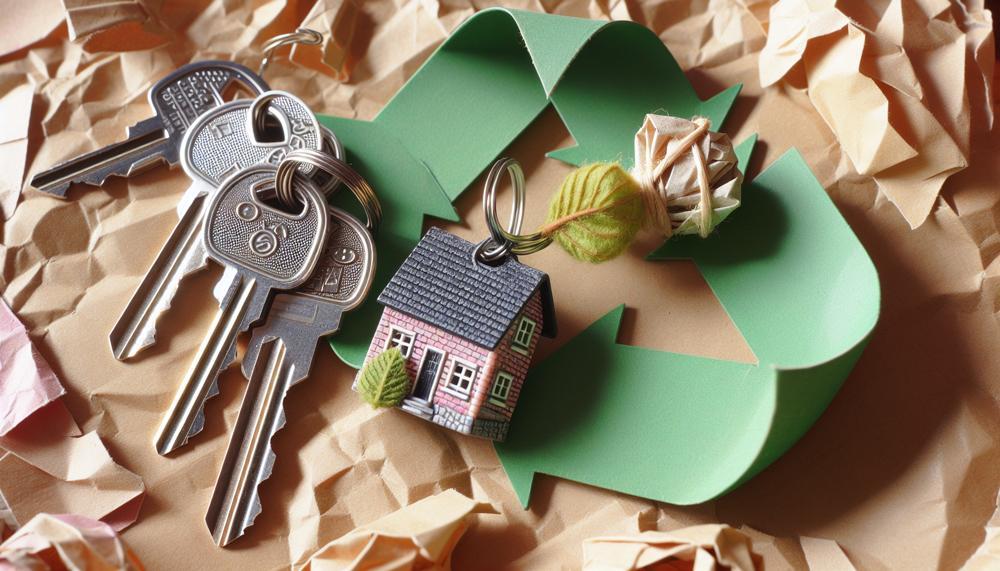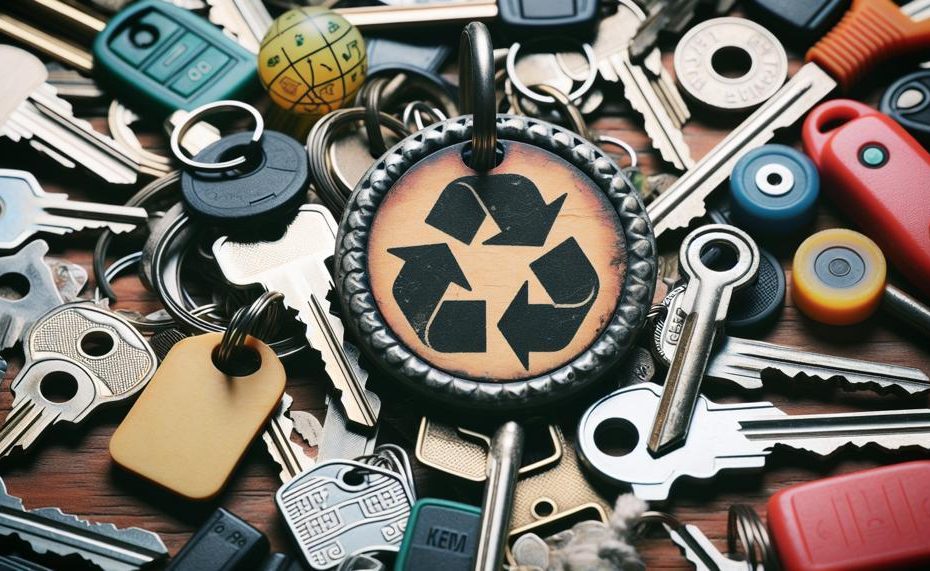Unlock the secrets of key recycling with our latest blog post. While these small metal objects may seem insignificant, they actually hold great potential for environmental impact. So why should we care about recycling keys? Let’s explore:
- Keys are made from valuable materials like brass, steel, and nickel that can be repurposed instead of ending up in landfills.
- Recycling keys reduces the need for mining and manufacturing new metals, conserving energy and resources.
- Improperly disposed keys can harm wildlife and ecosystems, making recycling a crucial step towards protecting our planet.
- By recycling keys, we can all play a part in creating a more sustainable future.
But how do you recycle keys? In this post, we’ll share expert tips on how to properly recycle your old or unwanted keys. Say goodbye to jingling keychains and hello to a greener world.
Contents
Can You Recycle Keys?
When it comes to properly disposing of old keys, there are multiple ways to recycle them and give them a new purpose. These methods include recycling them at local centers, selling them for cash, using them for practical purposes, or even giving them away as gifts.
- Recycling at Local Centers – Keys made entirely of metal can usually be recycled. However, those with plastic on them must have the plastic removed before they can be recycled. This is because mixed plastic and metal products are too expensive to recycle together. When it comes to old house keys, they should be placed in the mixed metal container at a local recycling center. From there, they will be melted down and molded into new objects for reuse. It’s important to note that keys cannot simply be left on the side of the road for recycling and must be taken to a designated area at a local dump.
- Selling for Money – Some types of keys, such as those with remote controls, can actually hold value and can be sold for money. The value of these keys depends on their rarity, design, and condition. However, selling old keys requires strong negotiation skills and may result in prices ranging from $1 to $500 depending on the buyer’s interest and the key’s value.
- Using for Practical Purposes – Unused keys can also be given as gifts or used for practical purposes such as cleaning or fixing items around the house. This not only helps reduce waste but also gives old keys a new purpose.
- Proper Disposal – To ensure old keys are properly disposed of, they should be sorted, packaged, and placed in a designated recycling bin. Other ways to get rid of old keys include giving them away as gifts or using them for practical purposes.
By following these different methods of recycling old keys, we can all contribute to reducing waste and protecting the environment.
What Type of Keys Cannot Be Recycled?
When it comes to recycling keys, not all types are created equal. While keys made of common metals like brass, aluminum, or steel can typically be recycled, there are certain types of keys that may not be accepted at recycling facilities. These include:
- Alloys: Some keys may be composed of alloys, which are a mixture of different metals. These types of keys may not be accepted for recycling as they can be difficult to break down and separate into individual metals.
- Non-metal components: Keys that contain non-metal components such as plastic or rubber may not be accepted at recycling facilities as they require a different recycling process.
- Electronic keys: Keys that have electronic components, such as electronic car keys or key fobs, should be disposed of at specialized electronic recycling facilities rather than traditional metal recycling facilities.
- Antique keys: Old skeleton keys or antique keys made of common metals may be accepted for recycling, but it’s always best to check with the facility first. Some recycling facilities may not accept them due to their historical value.
- Car keys: As mentioned above, car keys typically contain electronic components and should be disposed of at specialized electronic recycling facilities.
It is crucial to verify with your local recycling facility what types of keys they accept for recycling. While most common metal keys can be recycled, it’s best to dispose of any electronic or non-metal keys at specialized facilities to ensure proper recycling and prevent contamination in the metal recycling process.
How Do You Recycle Keys?
In today’s world, it is imperative that we recycle keys, not only for the sake of our environment but also for economic reasons. Keys are typically made from metals, which can be melted down and reused in the production of new products.
However, not all recycling centers accept keys due to the mix of materials, such as rubber or plastic components. Therefore, it is essential to first check with your local facility to see if they accept keys for recycling.
One way to recycle keys is by selling them through online platforms or auctions. Interestingly, some keys, especially those that are rare or from vintage items, can be valuable to collectors. Their value is determined by their condition and rarity, so it is necessary to store and maintain them properly if you plan on selling them.
Another creative way to recycle keys is by repurposing them for practical use. Unused keys can be given as gifts or used for cleaning or repairing items. For instance, a key can be used as a screwdriver or scraping tool, not only preventing it from ending up in a landfill but also reducing the need to purchase new tools.
Recycling old keys plays a crucial role in reducing the amount of waste in landfills and conserving natural resources. By recycling metal from keys, we can reduce the need for energy-intensive extraction processes and mining. Additionally, recycling old keys can save both individuals and businesses money by reducing the need for purchasing new metal materials.
Can You Put Them in the Trash?
This is because keys are made from valuable materials that can be recycled and repurposed. By recycling keys, we not only do our part to protect the environment but also help conserve resources and reduce pollution.
However, it’s important to note that not all keys can be recycled in the same way.
Different key manufacturers may have specific recycling instructions, so it’s best to check with your local facilities or the key manufacturer for proper disposal methods.
Additionally, recycling keys also helps conserve valuable resources such as metal and plastic, which are used to make new keys.

Why Recycle Keys?
Recycling keys is essential in reducing waste and minimizing our environmental impact. Not only does it help conserve resources and reduce pollution from new material production, but it also prevents them from ending up in landfills, where they can take hundreds of years to decompose and release harmful chemicals into the environment.
Properly sorting keys by type and material is crucial for efficient recycling. Most key materials, such as steel, brass, aluminum, copper, zinc, nickel, titanium, gold, silver, and iron are easily recyclable. Even plastic keys can be recycled depending on the type of plastic they are made from. By sorting keys before recycling, we can ensure that each material is properly processed and reused.
There are different methods available for recycling keys based on their material. Metal keys can be melted down and used to create new products, while plastic keys can be shredded and repurposed into new plastic items. It’s essential to research local recycling facilities to determine the best method for your key collection.
Properly preparing keys before recycling is also crucial. This includes removing any non-recyclable components such as rubber or electronics and separating them by type and material. By doing so, we can ensure a smooth recycling process and increase the chances of the keys being accepted by the facility.
Keys can be dropped off at local recycling facilities in person or mailed to them. If no facilities are available in your area that accept keys, there are specialized online programs for key recycling that can be contacted.
In addition to recycling, old keys can also be repurposed in creative ways to reduce waste and promote sustainability. They can be turned into unique pieces of art or repurposed for functional use like keychains or jewelry.
Can You Do Anything Else With the Old Keys?
Yes, there are numerous methods to give old keys a new purpose rather than just throwing them away. These inventive ideas not only help reduce waste but also add a special touch to your home décor.
Building and Crafting: Give Old Keys a New Life
One of the most popular ways to repurpose old keys is to use them in building and crafting projects. For instance, you can create a hanging hook by attaching an old key to a piece of wood or metal. This can be used to hang coats, hats, or even as a key holder.
You can also make key ornaments by painting the keys with different colors and designs, and then hanging them on a Christmas tree or using them as wall decorations.
Decorative Pieces: Repurpose Old Keys in Creative Ways
Old keys can also serve as decorative pieces in various ways. For example, you can use them as weights for holding down paper or other lightweight items. They can also be used as drawer or cabinet pulls by attaching them with screws.
Another imaginative idea is to craft a winged key display by attaching keys to different lengths of wire and arranging them in a shadow box frame.
Functional Uses: Utilize Old Keys for Practical Purposes
In addition to building and crafting, old keys can also be utilized for functional purposes. One idea is to use a key as a last-minute plumb bob by tying a string around it and using it for quick measurements. You can also tie old keys to a stick or piece of driftwood to create a wind chime, adding a whimsical touch to your outdoor space.
Another unique idea is to stick old keys together with glue to make antique home crafts, such as bowls, bottles, glass, and round sculptures for display.
The Environmental Benefits of Recycling Keys
Recycling keys has a positive impact on the environment by reducing waste, preserving natural resources, and promoting a circular economy. In addition, it helps decrease energy consumption and raise awareness of the significance of recycling.
Keys are more than just tools to open doors; they hold the potential to unlock a sustainable future. By recycling old keys, we can prevent them from ending up in landfills, where they take hundreds of years to decompose and release harmful chemicals into the environment.
Instead, they can be melted down and repurposed, significantly reducing the need for mining new metals.
Moreover, recycling keys helps conserve natural resources such as iron, steel, and copper, which are used to make new keys. This reduces the strain on our planet’s resources and minimizes the negative impact of extracting them from the earth.
Additionally, reusing materials through recycling requires less energy than producing new ones, resulting in reduced emissions and conserving our planet’s energy reserves.
Recycling keys promotes a circular economy, where materials are continuously reused rather than discarded. This creates a more sustainable system that reduces waste and minimizes our carbon footprint. It also encourages us to rethink our consumption patterns and consider the environmental impact of our everyday choices.
By recycling keys, we not only contribute to a healthier planet but also raise awareness about the importance of recycling in general. Every small action adds up, and by choosing to recycle something as seemingly insignificant as keys, we can make a significant impact on the environment.
Also Read: How To Recycle Wet Cardboard?
Conclusion
In conclusion, the simple act of recycling keys may seem insignificant, but it holds immense potential for positive environmental impact.
By properly disposing of old keys, we can prevent them from polluting landfills and harming precious wildlife and ecosystems. Moreover, recycling keys helps conserve valuable resources and reduces the need for energy-intensive extraction processes.
Whether by selling them for cash, repurposing them for practical or decorative use, or dropping them off at a local recycling facility, each of us has the power to contribute to a more sustainable future.
Let’s unlock the secrets of key recycling and make a tangible difference in protecting our planet.




